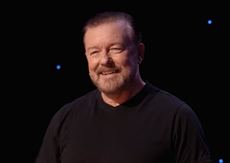Ricky Gervais’s Netflix special is nothing but cancel culture porn
The show is really just a series of trendy anti-woke statements followed by 15 seconds of Gervais laughing like he’s sat in the audience of a better comedian’s show


Your support helps us to tell the story
From reproductive rights to climate change to Big Tech, The Independent is on the ground when the story is developing. Whether it's investigating the financials of Elon Musk's pro-Trump PAC or producing our latest documentary, 'The A Word', which shines a light on the American women fighting for reproductive rights, we know how important it is to parse out the facts from the messaging.
At such a critical moment in US history, we need reporters on the ground. Your donation allows us to keep sending journalists to speak to both sides of the story.
The Independent is trusted by Americans across the entire political spectrum. And unlike many other quality news outlets, we choose not to lock Americans out of our reporting and analysis with paywalls. We believe quality journalism should be available to everyone, paid for by those who can afford it.
Your support makes all the difference.There’s a real difficulty in writing about stand-up comedy, because there are huge swathes of the population who will try to tell you that since comedy is an inherently subjective medium, it should essentially be free from any serious analysis or criticism.
I don’t really agree with that; comedy, like any form of art, is subject to the same general rules that govern all matters of taste. The trick to good comedy is playing with those rules, trying to get around them, and subverting them in interesting ways. We all recognise a bad joke when we see one. Anyway, on an unrelated note, I watched Ricky Gervais’s new Netflix special last night.
SuperNature is Gervais’s contribution to Netflix’s new business model of airing boring conservative lectures disguised as comedy instead of making season four of GLOW. It’s just over an hour long, which sounds quite short, but trust me: you’ll feel every minute of it.
It’s clear from the outset that Gervais has structured the entire show around courting the same audience that kept Dave Chapelle’s name in the paper well beyond his sell-by date, because he sure as hell didn’t structure it around jokes. Early on he tells the audience not to cheer and whoop for him because he isn’t interested in their praise, but you can tell that isn’t really true, because the show is really just a series of trendy anti-woke statements followed by 15 seconds of Gervais laughing like he’s sat in the audience of a better comedian’s show.
Intentional or not, Gervais is clearly eager to be cancelled by so-called virtue-signalling, woke hypocrites. He uses the example of Kevin Hart being uninvited to the Oscars for what Gervais claims were innocent jokes about hoping his son wouldn’t turn out to be gay, ignoring the fact that Hart was actually cancelled for calling multiple people “fags” on Twitter and calling another “a gay billboard for Aids.”
“You can’t predict what will be offensive in the future,” Gervais says, as if 2010 were some homophobic free-for-all.
One of the first things Gervais does is try to provide himself with a bulletproof defence against exactly the kind of reactions the show is designed to elicit. He makes a not-great joke about how there are no good female comedians, but then claims that the joke is really just a way to demonstrate the way his comedy is intended to operate.
“That was irony,” he says. “That’s when I say something I don’t really mean for comic effect, and you as an audience, you laugh at the ‘wrong’ thing [he actually does the little finger quotes here] because you know what the right thing is. It’s a way of satirising attitudes.”
But that isn’t really how comedy works, is it? Comedy works by exploiting or subverting shared known premises, not just by “saying the wrong thing” so that people can laugh at the opposite, whatever that means. Arguably the joke here is that Gervais is playing off the idea that people think he’s sexist, like he’s saying it in character, but he doesn’t give it time to breathe long enough before jumping to justify it, so it’s really just a contextless, sexist statement.
It’s frustrating, because what Gervais seems to think he’s doing would actually make for a pretty good show. In this age of comedians making a name for themselves by leaning on tired, 1980s-style, the-point-is-the-offence comedy, an old hand like Gervais deconstructing this renewed desire for mean-spirited anti-woke stand-up would be kind of interesting. There’s actually a point late in the show where he does achieve this, delivering an in-character spiel about racism where the punchline is itself a somewhat racist statement. It works! It’s structured like a real joke! It’s an actual, clever subversion of a sensitive, potentially offensive premise!
That isn’t the case for most of the special though. Most of the bits Gervais does are either flavourless observational comedy with some swearing thrown in, high school-level shock humour (he literally does a dead baby joke in the first 10 minutes), or the thing that 99 per cent of people who talk about this show will talk about: anti-woke, anti-trans, anti-funny “comedy.”
As was the case with Chappelle’s anti-trans jokes in his specials, or Jimmy Carr’s more recent “dead traveller joke” controversy, the problem with Gervais isn’t the fact that he’s joking about some forbidden-fruit subject matter. In theory, you really can joke about anything, and defenders of this kind of material are right when they say that nothing should be off the table. Because offence isn’t in itself a bad thing, and enjoying the shock of a well-done piece of subversion doesn’t necessarily make you a monster.
The issue is more with the way the jokes are structured. Comedy relies on the premise that there are certain truths that exist in the world, and comedy happens when we either shine a spotlight on those truths or subvert them in some way. Even the laziest fart joke is a subversion of the premise that manners exist in polite society; that’s why it’s funnier to fart in front of the Queen than it is to fart in a frat house.
To keep up to speed with all the latest opinions and comment, sign up to our free weekly Voices Dispatches newsletter by clicking here
The problem with Gervais’s jokes about trans people is that they rely on the premise that the trans experience is in some way illegitimate. The jokes work only if you buy into that reality from the outset. That’s why you’re going to read a thousand op-eds accusing him of disseminating hate, because whether he means to or not it seems to me that’s exactly what he’s doing.
There’s a point later in the show where Gervais claims that the worst thing you can say today is “women don’t have penises.” That pretty much typifies the problem, not just with this special, but with all of these cases of comedians who are piled on for their tendency to punch down. It is extremely acceptable to say that women don’t have penises; if anything, it’s the dominant view and one that is echoed by conservative commenters the world over. Trans people are one of the last bastions of acceptable prejudice, but if you listened to Gervais you’d think they controlled the world.
That’s the real issue here: that Gervais positions himself as some kind of free-thinking superhero speaking truth to power, when I can’t help thinking that all he’s really doing is helping to perpetuate a system of reactionary conservatism that has been in place since most of us were born.
Netflix has already commissioned another special from Gervais, because of course it has. There’s a lot of money in never shutting up about the things you supposedly aren’t allowed to say. I doubt Gervais will do much self-reflection between now and its release, but maybe we’ll get lucky and he’ll write some actual jokes.




Join our commenting forum
Join thought-provoking conversations, follow other Independent readers and see their replies
Comments